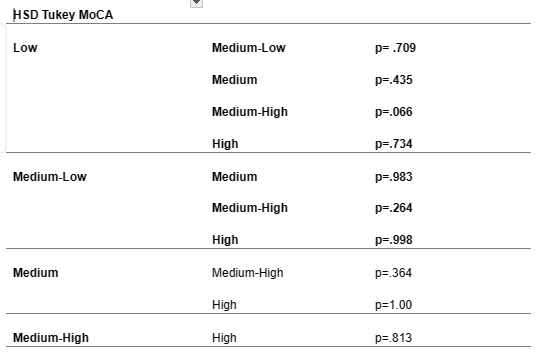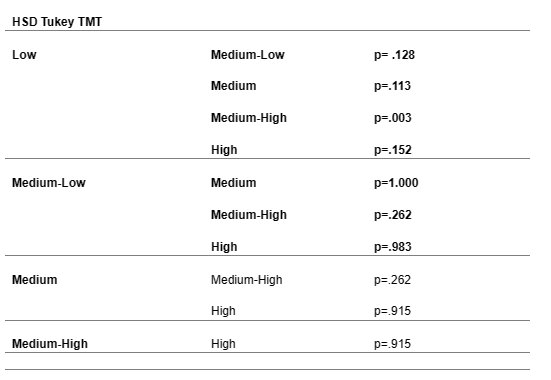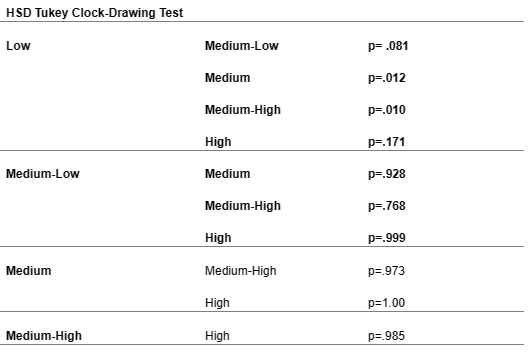Category: Parkinson's Disease: Cognitive functions
Objective: To evaluate whether cognitive reserve in patients with Parkinson’s Disease (PD) influences executive function.
Background: Cognitive Reserve (CR) is linked to various aspects of life experience, including higher intelligence quotient (IQ), educational attainment, complexity and duration of occupation, and lifestyle.[1] Various methods like the Cognitive Reserve Index questionnaire (CRIq) have been devised to gauge CR.[2] In Parkinson’s disease (PD), CR has been suggested to influence executive functions and memory [3].
Method: Cross-sectional study performed from June 2022 to December 2023. Consecutive patients with PD were recruited from the Movement Disorders Clinic at our Hospital. They underwent neuropsychological evaluation with the Montreal Cognitive Assessment (MoCA) and the Cognitive Reserve Index questionnaire (CRIq). CI was defined as a MoCA score <26. CR was classified according to CRIq score as Low (<70), Medium-Low (70-84), Medium (85-114), Medium-High (115-130), and High (>130). Demographic characteristics and neuropsychological evaluation total scores between CR subgroups were compared using one-way ANOVA. Visuospatial/executive functions from MoCA (Trail Making Test, TMT; copy cube test, CCT; and clock-drawing test, CDT) were further analyzed to assess potential differences between cognitive reserve subgroups.
Results: We included 120 patients, 75 (62.5%) male, with a mean age 63.7 (53-85) years. We found that cognitive reserve was low in 8 (6.7%) patients, medium-low in 26 (21.7%), medium in 59 (49.2%), medium-high in 20 (16.7%), and high in 7 (5.8%). Cognitive impairment was present in 84 (70%) patients. We found no significant differences in MoCA scores between cognitive reserve subgroups (p=0.93). However, we found significant differences in executive function items TMT (p=0.007), and CDT (p=0.018), with post-hoc analysis using the Tukey’s Honestly Significant Difference (HSD) test, revealing that subgroups with Medium-high CR performed significantly better than those with Low CR in TMT (p=0.003), CCT (p=0.045), and CDT (p=0.012).
Conclusion: We found no significant influence of CR in cognitive impairment as assessed by MoCA total score. However, our results suggest that higher CR, particularly in the Medium-High category, is associated with better performance in executive function items of MoCA.
Sociodedmograhpy
Anova
Tukey MOCA
Tukey TMT
Tukey CUBE
Tukey Clock
References: 1 Petersen RC, Smith GE, Waring SC, Ivnik RJ, Tangalos EG, Kokmen E. Deterioro cognitivo leve: caracterización clínica y resultado. Arco Neurol. 1999;56(3):303–8.
2 Stern Y. Reserva cognitiva en el envejecimiento y la enfermedad de Alzheimer. Lanceta Neurol. 2012;11(11):1006–12.
3 Nucci M, Mapelli D, Mondini S. Cuestionario del índice de reserva cognitiva (CRIq): un nuevo instrumento para medir la reserva cognitiva. Envejecimiento Clin Exp Res. 2012;24(3):218–26.
4 Loftus AM, Gasson N, Lopez N, Sellner M, Reid C, Cocks N, et al. Cognitive reserve, executive function, and memory in Parkinson’s disease. Brain Sci [Internet]. 2021;11(8):992. Disponible en: http://dx.doi.org/10.3390/brainsci11080992
To cite this abstract in AMA style:
J. Trejo-Ayala, P. Téllez-Hernández, S. Castillo-Torres, D. Ortiz-Zacarias, A. de León-Pérez, B. Chávez-Luevanos, I. Estrada-Bellmann. Cognitive Reserve may influence Executive Function in Parkinson’s Disease. [abstract]. Mov Disord. 2024; 39 (suppl 1). https://www.mdsabstracts.org/abstract/cognitive-reserve-may-influence-executive-function-in-parkinsons-disease/. Accessed February 2, 2026.« Back to 2024 International Congress
MDS Abstracts - https://www.mdsabstracts.org/abstract/cognitive-reserve-may-influence-executive-function-in-parkinsons-disease/






